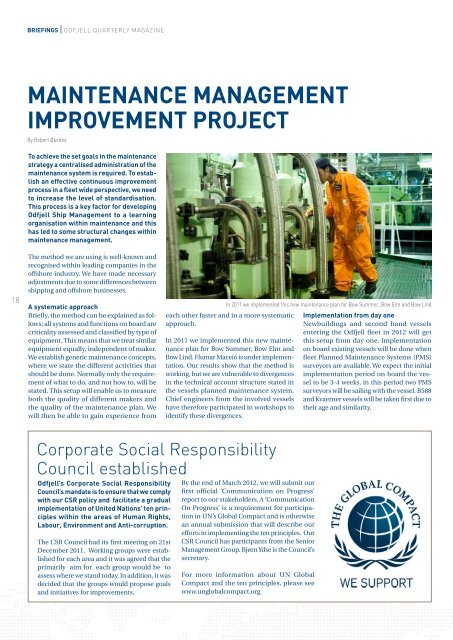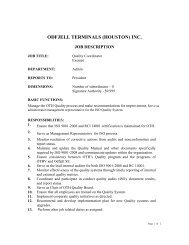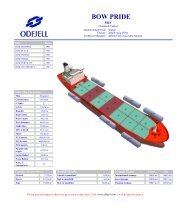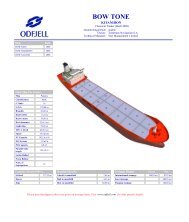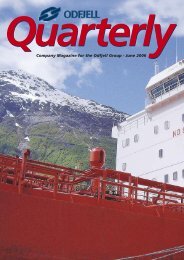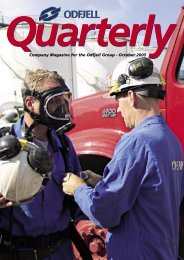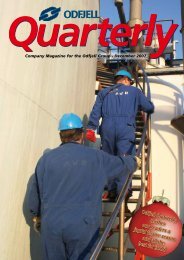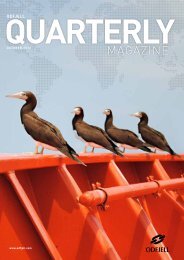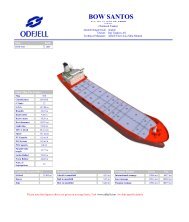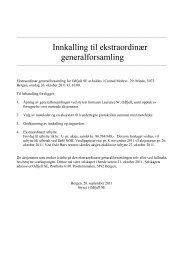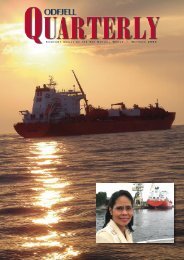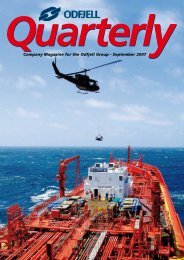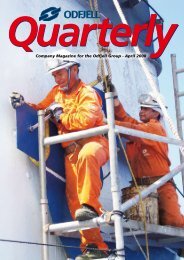Create successful ePaper yourself
Turn your PDF publications into a flip-book with our unique Google optimized e-Paper software.
18<br />
BRiEFiNgS odfjell quarterly magazine<br />
MAiNTENANCE MANAgEMENT<br />
iMPROVEMENT PROJECT<br />
By Robert Øksnes<br />
To achieve the set goals in the maintenance<br />
strategy a centralised administration of the<br />
maintenance system is required. To establish<br />
an effective continuous improvement<br />
process in a fleet wide perspective, we need<br />
to increase the level of standardisation.<br />
This process is a key factor for developing<br />
<strong>Odfjell</strong> Ship Management to a learning<br />
organisation within maintenance and this<br />
has led to some structural changes within<br />
maintenance management.<br />
The method we are using is well-known and<br />
recognised within leading companies in the<br />
offshore industry. We have made necessary<br />
adjustments due to some differences between<br />
shipping and offshore businesses.<br />
A systematic approach<br />
Briefly, the method can be explained as follows;<br />
all systems and functions on board are<br />
criticality assessed and classified by type of<br />
equipment. This means that we treat similar<br />
equipment equally, independent of maker.<br />
We establish generic maintenance concepts,<br />
where we state the different activities that<br />
should be done. Normally only the requirement<br />
of what to do, and not how to, will be<br />
stated. This setup will enable us to measure<br />
both the quality of different makers and<br />
the quality of the maintenance plan. We<br />
will then be able to gain experience from<br />
<strong>Odfjell</strong>’s Corporate Social Responsibility<br />
Council’s mandate is to ensure that we comply<br />
with our CSR policy and facilitate a gradual<br />
implementation of United Nations’ ten principles<br />
within the areas of Human Rights,<br />
Labour, Environment and Anti-corruption.<br />
The CSR Council had its first meeting on 21st<br />
December 2011. Working groups were established<br />
for each area and it was agreed that the<br />
primarily aim for each group would be to<br />
assess where we stand today. In addition, it was<br />
decided that the groups would propose goals<br />
and initiatives for improvements.<br />
each other faster and in a more systematic<br />
approach.<br />
In 2011 we implemented this new maintenance<br />
plan for Bow Summer, Bow Elm and<br />
Bow Lind. Flumar Maceió is under implementation.<br />
Our results show that the method is<br />
working, but we are vulnerable to divergences<br />
in the technical account structure stated in<br />
the vessels planned maintenance system.<br />
Chief engineers from the involved vessels<br />
have therefore participated in workshops to<br />
identify these divergences.<br />
corporate Social responsibility<br />
council established<br />
In 2011 we implemented this new maintenance plan for Bow Summer, Bow Elm and Bow Lind<br />
By the end of <strong>March</strong> <strong>2012</strong>, we will submit our<br />
first official ‘Communication on Progress’<br />
report to our stakeholders. A ‘Communication<br />
On Progress’ is a requirement for participation<br />
in UN’s Global Compact and is otherwise<br />
an annual submission that will describe our<br />
efforts in implementing the ten principles. Our<br />
CSR Council has participants from the Senior<br />
Management Group. BjørnYdse is the Council’s<br />
secretary.<br />
For more information about UN Global<br />
Compact and the ten principles, please see<br />
www.unglobalcompact.org<br />
implementation from day one<br />
Newbuildings and second hand vessels<br />
entering the <strong>Odfjell</strong> fleet in <strong>2012</strong> will get<br />
this setup from day one. Implementation<br />
on board existing vessels will be done when<br />
fleet Planned Maintenance Systems (PMS)<br />
surveyors are available. We expect the initial<br />
implementation period on board the vessel<br />
to be 3-4 weeks, in this period two PMS<br />
surveyors will be sailing with the vessel. B588<br />
and Kvaerner vessels will be taken first due to<br />
their age and similarity.


